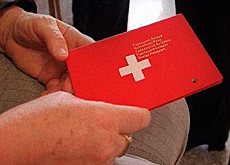Federal Court says democracy has its limits

Switzerland’s highest court says the country’s system of direct democracy must stay within the limits of the law.
The Federal Court’s comments came in a written explanation of a ruling made on July 9, banning secret ballots on applications for Swiss citizenship.
The judges said that Swiss voters, while traditionally having the last word on all political decisions, were still obliged to respect federal legislation.
Several Swiss communities, most notably Emmen in canton Lucerne, hold secret ballots to decide on citizenship. Critics of the procedure say it leads to racial discrimination.
The federal judges upheld this view in their written ruling, saying that unfair ballot decisions cannot be justified by claims that direct democracy overrules everything else.
Voters in Emmen have been deciding on citizenship by secret ballot for three years. In that time 97 people, most of them from the former Yugoslavia, have had their applications rejected, despite fulfilling all the legal requirements for Swiss nationality.
On Wednesday the local authority in Emmen said it was imposing a moratorium on naturalisations while it considered the Federal Court’s ruling.
The Swiss Federal Commission on Racism, which has been concerned about arbitrary citizenship decisions for some time, welcomed the Federal Court’s decision.
Discrimination issue
The Commission said the ruling would serve to uphold the basic human rights contained in the Swiss constitution, in particular the right to protection from discrimination.
But the decision from the Federal Court has divided legal opinion in Switzerland.
Uli Windisch, professor of sociology at the University of Geneva, believes the ruling displays a lack of trust in Swiss voters and their decision-making ability.
Rainer Schweizer, law professor at the University of St Gallen, says the federal judges have undermined Switzerland’s system of direct democracy. He maintains that secret ballots are under no legal obligation to be fair.
But Professor Clive Church, an expert in Swiss politics from the University of Kent in England, says the court made the right decision.
“It seems to me that a vote on something as sensitive as naturalisation does lend itself to arbitrariness,” he told swissinfo.
“By voting on naturalisation you are using direct democracy in a situation which is specifically directed against individuals, which does seem to be fairly [doubtful] in terms of the European Convention on Human Rights.”
Public votes criticised
However, the federal judges did not give a written ruling on the practice of deciding applications for Swiss citizenship at open community meetings.
Traditionally voters in Swiss towns and villages can decide on policy, including naturalisations, by a show of hands.
This procedure has also been criticised by leftwing and anti-racism groups, who point to a notorious case in canton Schwyz in which two sisters, both born in Switzerland but of Yugoslav nationality, have had their applications for Swiss citizenship turned down three times at community meetings.
But the judges said a ruling on this kind of voting was not appropriate, since the case before the Federal Court had originally cited only secret ballots as a problem.
Applying for Swiss citizenship is a long and complicated process. People not married to Swiss nationals have to live in Switzerland for 12 years before applying, and must pay high fees for their applications to be considered.
Being born in Switzerland does not give people an automatic right to Swiss citizenship, and as a result Switzerland has one of the lowest naturalisation rates in Europe.
Parliament is currently considering ways to simplify the naturalisation process, in particular for second- or third-generation foreigners.
swissinfo with agencies
The Federal Court has ruled that citizenship applications can no longer be decided by secret ballot.
Several Swiss cantons have been using secret ballots, but critics say it leads to racial discrimination.
In the town of Emmen in canton Lucerne, most people from the former Yugoslavia have had their applications for Swiss citizenship rejected over the last three years.
The federal judges say direct democracy must stay within the limits of constitutional law.

In compliance with the JTI standards
More: SWI swissinfo.ch certified by the Journalism Trust Initiative












You can find an overview of ongoing debates with our journalists here . Please join us!
If you want to start a conversation about a topic raised in this article or want to report factual errors, email us at english@swissinfo.ch.